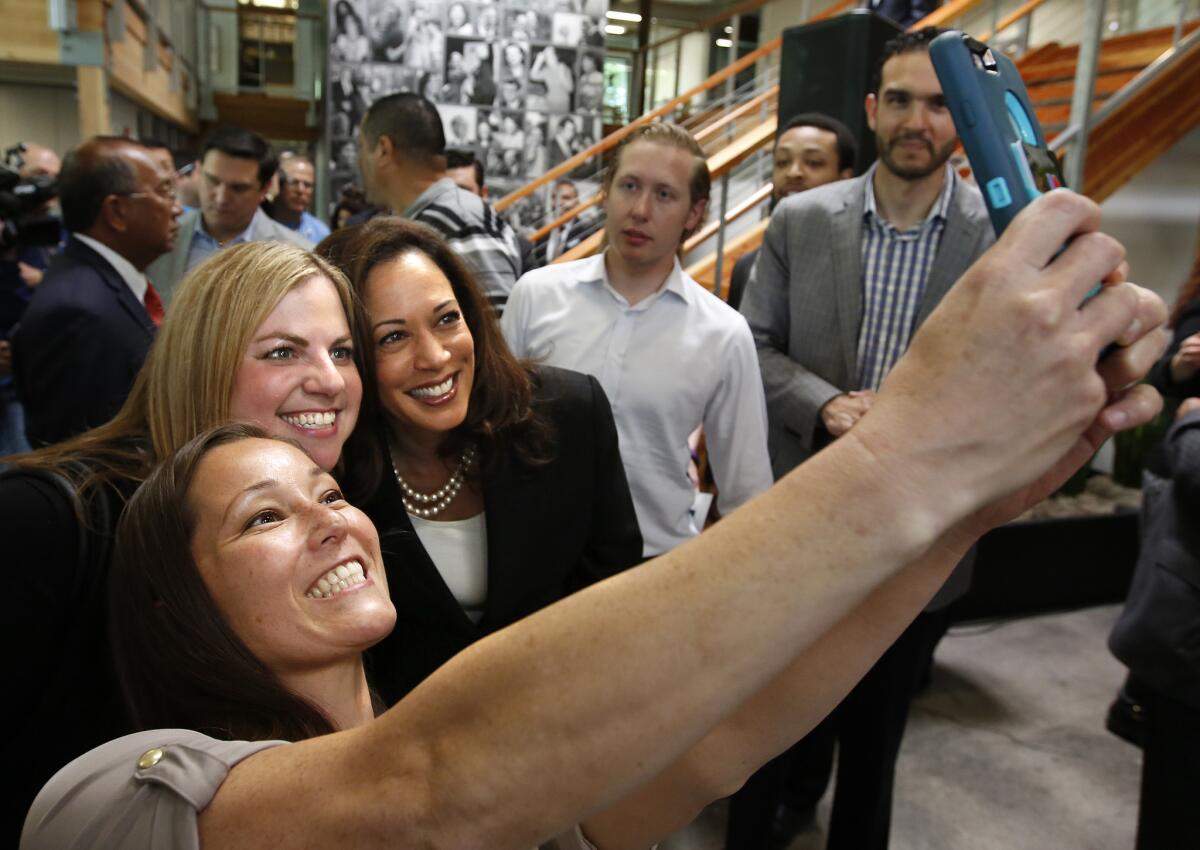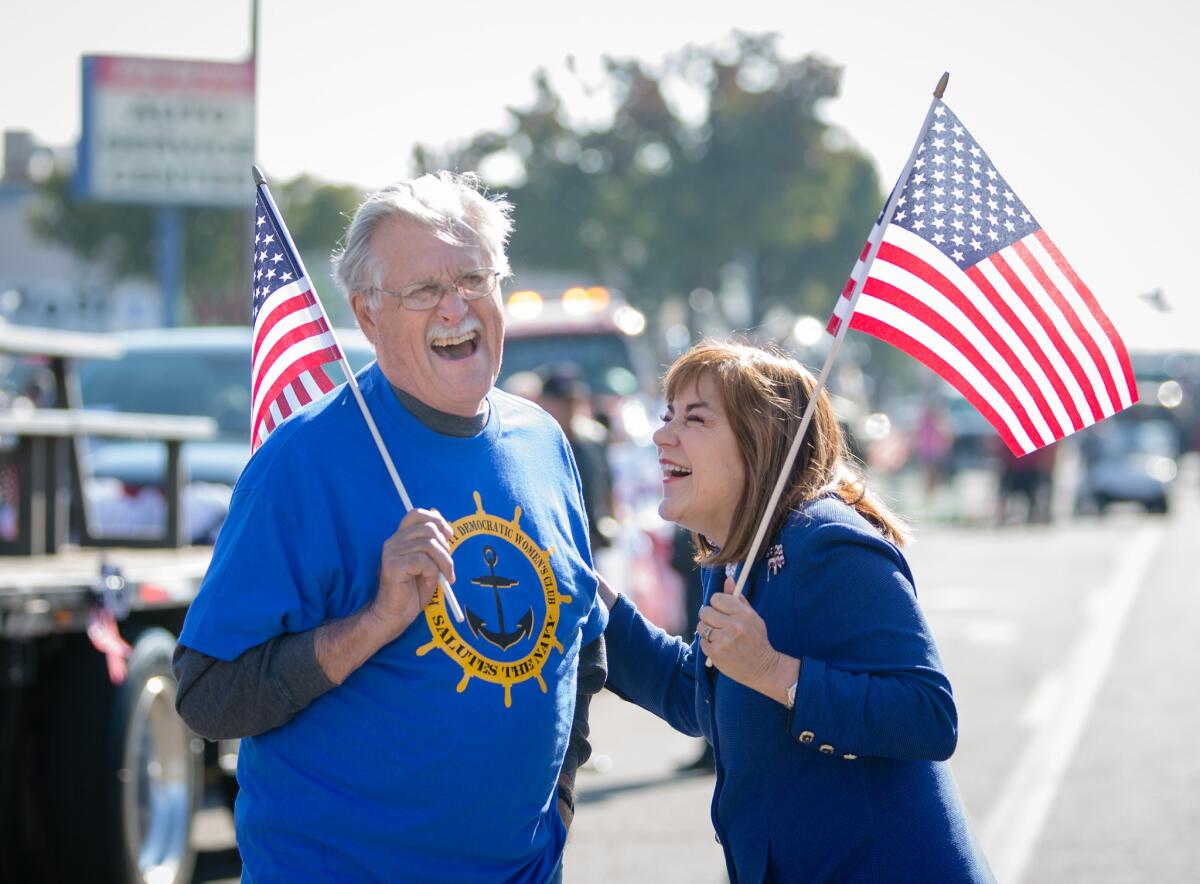Can a San Francisco liberal win the Central Valley in the race for U.S. Senate?

Top-of-the-ticket Democrats rarely fare well in California’s Central Valley.
Gov. Jerry Brown has won six statewide elections, but in tiny Colusa County north of Sacramento, where his great-grandfather August Schuckman planted the family roots in the 1850s, victory eluded him every time. California voters elected Dianne Feinstein to the U.S. Senate five times, but she never captured oil-rich Kern County, where her father grew up.
But voters in both counties won’t have any choice but to select a Democrat for U.S. Senate in Tuesday’s election, because that’s their only option — Atty. Gen. Kamala Harris and Orange County Rep. Loretta Sanchez are the only two candidates on the ballot.
In the era of the top-two primary, which sends first- and second-place finishers to the general election regardless of party, the outcome of the Harris-Sanchez race in the Central Valley could influence the tactics of candidates as early as the 2018 governor’s race.
The Central Valley remains one of the biggest wildcards in Tuesday’s election and will test whether the front-running Harris, a Bay Area progressive and the party’s favored candidate, has the political strength to win over voters outside the comfort of her liberal base. Harris struggled to do so in the past, losing the vast majority of Central Valley counties in her 2010 and 2014 campaigns for attorney general. But those races were against Republicans.
“People in the valley have a distasteful view of politicians from the Bay Area,” said Doug Kessler, one of the California Democratic Party’s regional directors in the Central Valley. “They are very aware of how progressive Harris is. Republicans especially.”
For Sanchez, the Central Valley will test the viability of a Democrat running as a fiscal moderate who has tailored her campaign to appeal to Republicans, independents and Latinos.
Tim Clark, who ran Republican Fresno Mayor Ashley Swearengin’s 2014 campaign for state controller, said he expects Sanchez to do well in counties with substantial Latino populations, including Kern, Fresno and Stanislaus. But Clark thinks Harris will overcome that because the region has seen a spike in crime and her ballot designation of “attorney general” could carry a lot of weight with voters.
“I expect Kamala to run strong there, but I expect Loretta to do better there than the rest of the state,” Clark said. “At the end of the day, I don’t expect to Loretta to win those counties.”
The Central Valley stretches from Bakersfield up to Redding and is home to some of the nation’s most productive and lucrative farmland. Yet it is largely neglected by statewide politicians drawn to the ample votes and wealthy donors in Southern California and the Bay Area, said Fresno State political scientist Thomas Holyoke.
“Democrats usually go to Silicon Valley, raise huge amounts of money, and then go down to Hollywood to raise huge amounts of money,” Holyoke said. “People here, Republicans and Democrats, largely feel ignored. And they are ignored.”
On many of the most pressing issues facing the valley, Harris and Sanchez align.
Both Democrats support fixing the nation’s immigration policy — which is essential to growers who depend on farm workers — and providing a pathway to citizenship for immigrants in the country illegally. They support California’s high-speed rail project, which will cut through the heart of the Central Valley and provide jobs.
On water, however, there is a divide. And that’s no small thing where people rely on farming and ranching for their livelihood.
“People in the valley don’t vote for party. They vote for issues. There’s no greater issues than water and jobs,” said Republican political consultant Hector Barajas. “With no water, there is no agriculture. Restaurants close. Schools close.”
Sanchez says the state needs to increase water storage to help alleviate prolonged periods of drought. She supported legislation by Feinstein that could provide some federal funding for the state’s two largest proposed storage projects — Sites Reservoir in the Sacramento Valley and Temperance Flat Dam on the San Joaquin River. Sanchez has not taken a firm position on the dam projects, but said she is willing to hear from all sides on the issue.

Harris told the Sacramento Bee editorial board in May that she was “not familiar” with the projects — a response that Sanchez has openly mocked. Harris opposes amending federal endangered species laws in order to increase the state’s water supply, while Sanchez has said everything must be “on the table.’’
“We have to diversify water policy in the state, and that means putting equal emphasis on conservation and recycling and capturing storm water … and desalination,” Harris told reporters after a rally in Elk Grove on Thursday. “It’s also about rejecting the false choice that suggests that you’re either in favor of a farmer or a fish.”
Both Harris and Sanchez back the sweeping proposal to build twin underground tunnels to transport water through the Sacramento-San Joaquin River Delta region.
California’s farm revenue declined by more than 17% in 2015 for a total of $47 billion, in large part because of the drought, according to the California Department of Food and Agriculture.
“That should be concerning, and no one is batting an eye,” said Aubrey Bettencourt of the California Water Alliance, a Central Valley nonprofit backed by farmers.
Bettencourt said the water crisis has received more attention from politicians expected to run for governor in 2018 than those in the Senate race, including Los Angeles Mayor Antonio Villaraigosa, who has been a frequent visitor to the valley over the last year.
Sanchez has taken campaign trips through the southern Central Valley several times in just the last month, touting endorsements from Rep. Jim Costa (D-Fresno) and former Assembly Speaker and Lt. Gov. Cruz Bustamante of Fresno.
But the Fresno County Democratic Party is behind Harris, since she won the endorsement of the California Democratic Party in February, said local party chairman Mike Evans.
A year ago, Evans openly complained that Harris had been a rare sight in the valley. Since the primary, however, the attorney general has come through the region several times talking with ranchers, farm workers and residents in both the cities and country, he said.
“Loretta Sanchez does have some support among Latinos in particular, and she seems to have some crossover support with Republicans,” Evans said. “But I expect Harris to do well here.”
Follow @philwillon on Twitter
ALSO:
California’s U.S. Senate race is slipping away from Loretta Sanchez
Riding high in the U.S. Senate race, Kamala Harris pushes to help down-ballot Democrats
Hurting for support in her own party, Rep. Loretta Sanchez tilts her Senate campaign to the right
Updates on California politics
More to Read
Get the L.A. Times Politics newsletter
Deeply reported insights into legislation, politics and policy from Sacramento, Washington and beyond. In your inbox three times per week.
You may occasionally receive promotional content from the Los Angeles Times.







